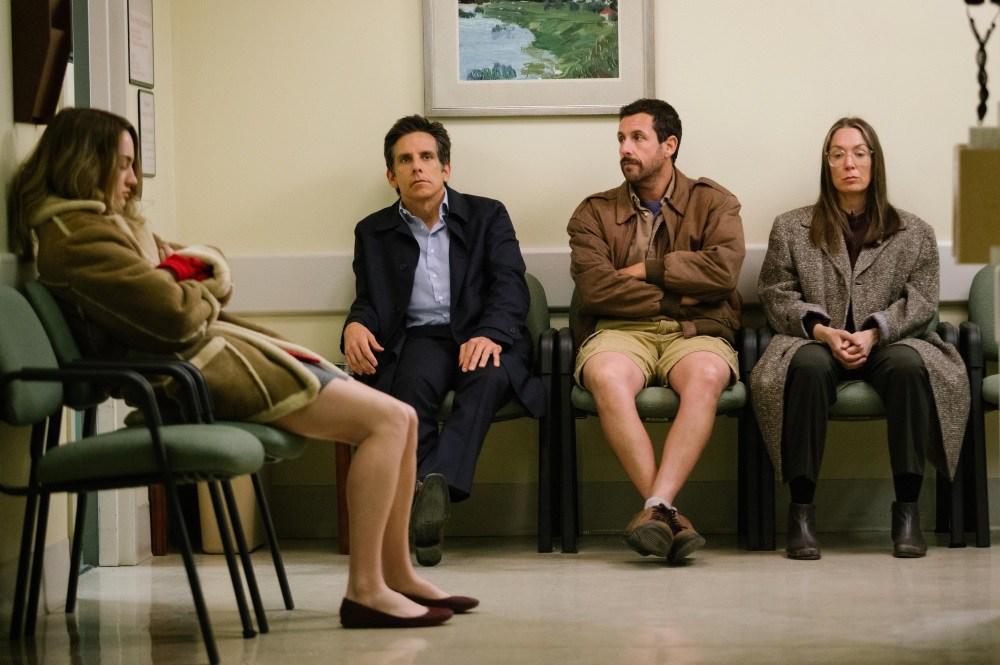The Meyerowitz Stories review - Cannes 2017: Adam Sandler gives poignant performance in Netflix-backed comedy
Noah Baumbach, 150 mins, starring: Adam Sandler, Dustin Hoffman, Ben Stiller, Candice Bergen, Emma Thompson.

The Meyerowitz Stories, the Netflix-backed movie which received its world premiere in Cannes this weekend, is another of writer-director Noah Baumbach’s queasy, intimate, very closely observed comedy-dramas about unhappy families. It is on the lengthy side and sometimes has a sour taste but it boasts one of Dustin Hoffman’s best performances in recent years - and a very poignant one too, a long way from Happy Gilmour-like goofiness, from Adam Sandler.
Hoffman plays Harold Meyerowitz, the family patriarch. He’s an artist and sculptor who is thoroughly convinced of his own genius - and very angry that the rest of the world hasn’t acknowledged it. Years ago, he sold a painting to the Whitney Museum but hasn’t had much success since then. Sandler plays his son, Danny, a likeable middle-aged loser who has split up from his wife and has given up on a once promising musical career. Intimidated by his father, he is utterly devoted to his daughter Eliza (Grace Van Patten.) She is studying filmmaking at college - and makes some wondrously bizarre, semi-pornographic short movies.
Sandler captures very convincingly his character’s sense of extreme frustration at the way his life has panned out. Danny can’t even find a parking spot in New York let alone a job. He has a bad hip which gives him a pronounced limp. He is heroic in his own way, though, and deals as best he can with his father’s very obvious disappointment in him.
There is strong work, too, from Ben Stiller as Danny’s half-brother, Matthew, a successful LA-based businessman who also has deep-rooted issues with his father.
Netflix Originals 2017: All the films and TV shows to look out for
Show all 14One of the joys of Hoffman’s performance lies in his glorious smugness. The rest of the family is neurotic in the extreme but Hoffman’s Harold doesn’t even begin to question the part he has played in screwing up his children’s lives. He expects Danny to do his bidding. In spite of his faltering career and his obvious jealousy of contemporaries whose careers have eclipsed his own, he still feels that he is in “the best years of my life” creatively. If he is a difficult personality, so is his partner Maureen (Emma Thompson), who is both eccentric and deeply selfish.
The humour is slow burning but often beautifully observed. One of the best early comic set-pieces sees Harold and Danny attending a New York gallery opening of a show featuring new work from one of Harold’s old friends. They’re like an upmarket New York version of Steptoe and Son, each getting on the other’s nerves. They’re the only ones in tuxedos and aren’t even on the guest list but Harold is far too thick-skinned to show any signs of social embarrassment. He gets to meet Sigourney Weaver, who shakes his hand, and spends much of the rest of the movie dropping her name.
Baumbach spends much of the first part of movie exposing his characters’ weaknesses and making them seem needy and unlikeable. In the second half of the film, almost all of them are shown in a far more sympathetic light. They’re no better and no worse than any other family.
The hospitalisation of one of the characters brings them altogether. They realise that the animosity between them is based on false premises. Stiller’s character isn’t quite as arrogant as he seems. Sandler’s isn’t the chump that he appears. Their very stern sister Jean (Elizabeth Marvel) has experienced childhood traumas which make her aloof behaviour far easier to understand.
The film has a very literary feel. Its title invokes memories both of J.D. Salinger stories and of Wes Anderson’s The Royal Tenenbaums. The pointed dialogue sounds as if it has been taken from a short story written for The New Yorker. In other words, The Meyerowitz Stories is very similar to all the other movies that Buambach has made in the last decade or so. It doesn’t carry any surprises. That, though, isn’t a negative. He’s a director with an instantly recognisable style and he probes away at the darker side of American family life in a way that is both affecting and often very funny.
Subscribe to Independent Premium to bookmark this article
Want to bookmark your favourite articles and stories to read or reference later? Start your Independent Premium subscription today.

Join our commenting forum
Join thought-provoking conversations, follow other Independent readers and see their replies